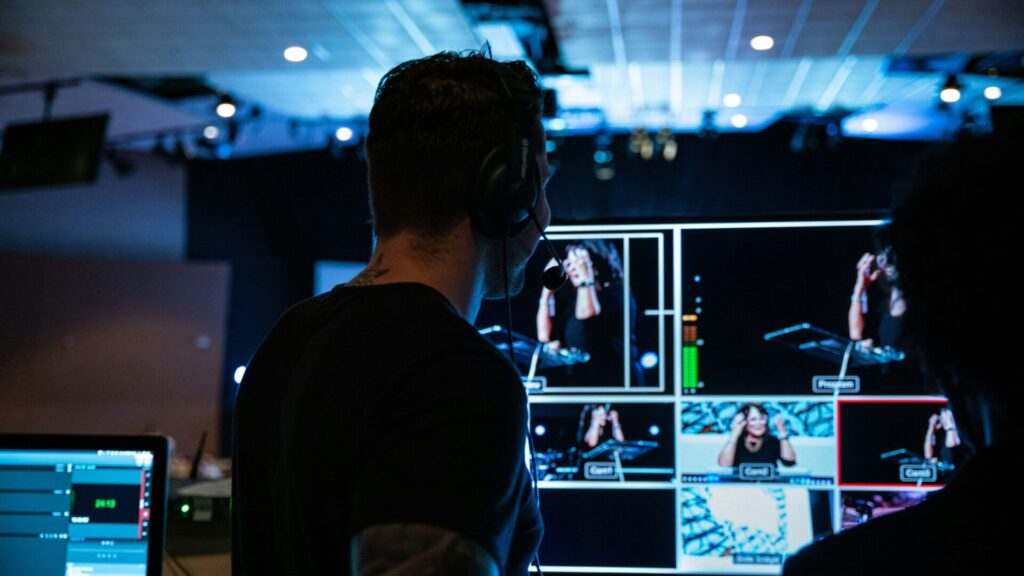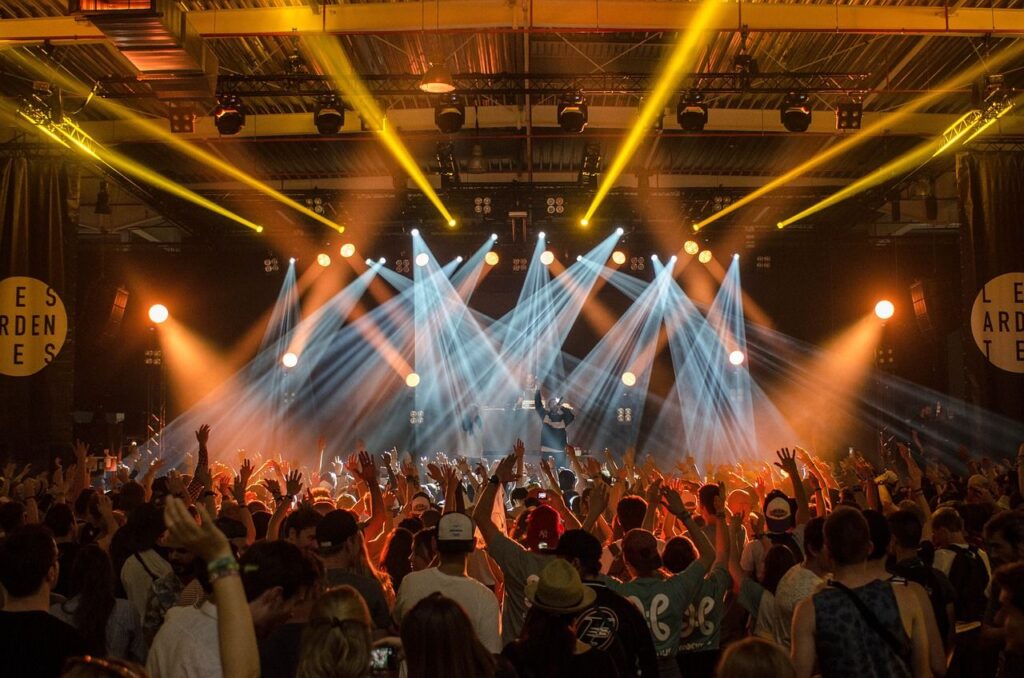In the world of broadcasting and event production, the role of a camera director is crucial to ensuring high-quality visuals and a satisfying viewing experience. Not only responsible for operating the cameras, a camera director also plays a major role in the success of large events, whether it’s a television show, music concert, or international conference. This article will discuss in detail the definition, duties, functions, and responsibilities of a camera director in a large event.
What is a Camera Director?
A camera director is a professional in the broadcasting industry responsible for overseeing all aspects of camera work during a live broadcast or recorded event. They collaborate with the camera team to ensure that every shot taken aligns with the visual direction provided by the producer or director. Behind the scenes, the camera director plays a crucial role in creating a cohesive visual flow for every event.
A director’s role is highly technical. They are not only skilled in operating cameras but also possess artistic and strong communication abilities to effectively direct the camera team.
Duties of a Camera Director
The primary duty of a director is to control the camera shots, ensuring that every visual element in the production runs smoothly and directing the camera team according to the instructions from the producer or director. Some of the main duties of a camera director include:
- Controlling Camera Shots
A director is responsible for ensuring that the camera captures the appropriate shots as per the event’s requirements. They direct the camera operators to adjust angles or framing based on the given instructions. - Coordinating with the Production Team
In a large event, the camera director works with many members of the production team, including the producer, director, audio technicians, and graphic designers. Effective coordination among these departments is vital for the smooth execution of the event. - Determining Camera Framing and Angles
A director determines the appropriate framing and angles to ensure the shots convey the story effectively. This includes deciding when to switch cameras, zoom in or out, and selecting the best angles to show desired details. - Managing Camera Transitions
In large events involving multiple cameras, smooth transitions between cameras are essential. A director determines when and how camera switches should occur to avoid abrupt or distracting transitions. - Overseeing Lighting Settings
Although primarily focused on cameras, the camera director must also ensure that the lighting used during the event is optimal. Poor lighting can damage the visual quality, so proper lighting setups are crucial. - Ensuring Visual Quality
A director monitors the overall visual quality to make sure the shots are sharp, focused, and free from technical glitches such as noise or other disturbances.
Functions of a Camera Director in a Large Event
A camera director’s function is to transform every visual detail of an event into an engaging experience for the audience. Some key functions of a camera director in a large event include:
- Enhancing the Viewing Experience
In large events such as music concerts, sports games, or international conferences, viewers rely on high-quality visuals for an immersive experience. A director ensures that the captured images elevate the viewing experience. - Ensuring the Delivery of Visual Messages
In events like conferences or seminars, delivering the message clearly is essential. Director must position the cameras appropriately so that the message being communicated by the speaker or event host is visible and comprehensible to the audience. - Managing a Dynamic Visual Flow
For dynamic events like sports games or live performances, a director is responsible for maintaining a fast-paced visual flow so the audience can follow the action without missing key details. - Adapting to Rapid Changes
In a large event, changes can occur quickly. Director must adapt to these shifts and immediately direct the camera team to adjust, such as when weather conditions change suddenly or an artist improvises during a performance. - Managing Camera Interaction with Other Elements
Many large events involve additional visual elements such as large screens, digital graphics, or pre-recorded videos. Director collaborates with the technical team to determine when and how these elements should be displayed without distracting from the main visuals.
Responsibilities of a Camera Director in Ensuring the Success of a Large Event
The success of a large event depends heavily on the collaboration of a solid production team. As part of this team, a camera director has significant responsibilities to ensure the event runs smoothly. Some of the main responsibilities of a camera director include:
- Preparing the Shot Plan
Before the event begins, the camera director works with the producer and director to create a detailed shot plan. This plan includes camera positions, shot angles, and the techniques to be used. Proper preparation helps the entire team execute their tasks effectively. - Managing the Camera Team
A camera director does not work alone. They must lead the camera operators, ensuring that each team member follows instructions correctly and works synchronously to capture the desired shots. - Monitoring Live Shot Quality
Cameras used in large events are typically connected to monitors in the control room. The camera director monitors the footage captured by the cameras and makes real-time decisions regarding adjustments that need to be made if the shots do not meet the required standards. - Maintaining Effective Communication
Communication is key to successful shot-taking. The camera director ensures that all team members communicate effectively and can respond promptly to instructions, especially in live events that require precise timing. - Managing Time and Accuracy
A large event typically follows a strict schedule, and the camera director must ensure that all shots are captured on time and in accordance with the event’s flow. Errors in timing can negatively affect the event’s smoothness and the viewer’s experience. - Handling Technical Issues
When technical problems arise, such as camera signal disruptions or malfunctioning equipment, the camera director must make quick decisions and find solutions to ensure the event continues smoothly without visual interruptions. - Post-Event Evaluation
After the event concludes, the camera director is also responsible for evaluating the footage. This includes checking if the shots were executed as planned and providing feedback to the team for improvements in future events.
Stages of a Camera Director’s Work from Planning to Evaluation
- Pre-Event Preparation (Pre-Production)
- Preparation Meeting: The camera director meets with the producer, director, and other team members to understand the event’s vision and technical requirements. This involves discussing the event’s script or rundown, selecting camera types, and determining camera placements and lighting setups.
- Creating Shot Plans: The camera director develops a detailed shot plan that includes camera positions (e.g., main, side, back), angles, and framing techniques.
- Equipment Testing: Prior to the event, the camera director leads the testing of all equipment, ensuring everything is functional and ready.
- Briefing the Camera Team: The camera director conducts a briefing to explain each operator’s role and the technical aspects of the cameras to ensure effective coordination during the event.
- During the Event (Live Production)
- Overseeing Live Shot Capture: The camera director supervises all live shot capture, ensuring that the shots are clear, focused, and meet the event’s visual needs.
- Coordinating with the Director and Camera Team: The camera director works closely with the director to follow artistic directions and provides technical instructions to the camera team.
- Managing Camera Transitions: They ensure smooth transitions between cameras during live action.
- Directing Specific Shots: They give instructions for specific shots, such as close-ups or unique angles during fast-paced actions.
- Solving Technical Problems Quickly: In the event of technical issues, the camera director quickly resolves them to ensure continuous coverage.
- Lighting and Visual Quality Management: They make adjustments to lighting and visual settings as needed during the event.
- Post-Event (Post-Production)
- Evaluating Shot Quality: After the event, the camera director evaluates the captured footage and provides feedback on the shot quality and flow.
- Team Discussion: The camera director holds a debriefing with the production team to discuss the successes and areas for improvement.
- Writing Reports: The camera director may write a post-event report documenting the entire shot-taking process and suggesting improvements.
- Providing Feedback to the Camera Team: They provide constructive feedback to the camera operators, helping them improve for future projects.
How Much Does It Cost to Hire a Camera Director?
In the world of broadcasting and event production, a camera director plays a crucial role in ensuring optimal visual quality throughout the event. Whether it’s a live broadcast, music concert, sports event, or TV production, having a skilled camera director can significantly enhance the overall quality of the show. However, how much does it cost to hire a director? This article will discuss the factors that influence the cost of hiring a director and provide estimates of the budget you need to prepare.
Factors Influencing the Cost of Hiring a Camera Director
- Experience and Reputation Like any profession, the cost of hiring a director is influenced by their experience and reputation. A director with years of experience and a proven track record in major events or well-known shows will charge more than someone who is just starting their career. A strong reputation and credibility within the industry naturally increase the cost of hiring a camera director.
- Event Duration The duration of the event also plays a role in determining the cost. For short events like brief TV shows or talk shows, the rental fee might be lower compared to events that last all day or span multiple days, such as large concerts or international conferences. The longer the event, the higher the cost.
- Type of Event The type of event also affects the cost of hiring a director. For example, events like sports competitions or music concerts that require multiple visual elements and fast-paced shot-taking need higher skill levels and more complex technical expertise. In contrast, simpler events like seminars or meetings may require a more affordable rate.
- Scale of the Event The scale of the event is another determining factor in cost. Large-scale events involving many cameras, technical crew, and complex setups will need more manpower and equipment, driving up the cost of hiring a camera director. Smaller or local events with fewer cameras and crew will generally cost less.
- Equipment Used The type of equipment used for the event also affects the budget. If the event requires advanced cameras or special technical gear, the cost of hiring a camera director may include the use of such equipment. Some camera directors may also rent or provide their own equipment, which will impact the overall cost.
- Event Location The location of the event is another significant factor. If the event is held in a remote location or requires travel, accommodation, and additional transportation costs, the cost of hiring a camera director will increase. This is particularly true if the event is held in a different city or country.
Estimated Cost of Hiring a Camera Director
While the cost can vary depending on several factors mentioned above, here are some estimated rates for hiring a camera director based on common event categories:
- Small Events (e.g., Seminars or Local Events) For relatively simple events like seminars, workshops, or local events with a small crew and short duration, the cost to hire a director typically ranges from IDR 2,000,000 to IDR 5,000,000 per day. This fee covers directing and operating a few cameras, as well as basic coordination with the production team.
- Medium-Sized Events (e.g., Talk Shows, Small Concerts) For slightly larger events like talk shows, small concerts, or live broadcasts with several cameras, the cost for hiring director could range from IDR 5,000,000 to IDR 10,000,000 per day. At this scale, the camera director is responsible for managing several camera operators, overseeing visual quality, and ensuring smooth transitions between cameras.
- Large Events (e.g., Big Concerts, Sports Events, International Conferences) For large-scale events involving many cameras, crew members, and technical setups, the cost of hiring director can reach IDR 10,000,000 to IDR 30,000,000 per day, or even more. Events such as large concerts, sports events, or international conferences require highly experienced camera directors to manage dynamic situations and numerous visual elements.
- Special Production Events If the event requires special production, such as the use of high-tech cameras, customized lighting setups, or virtual reality technology, the cost to hire director will be even higher. For these types of productions, the budget could range from IDR 20,000,000 to IDR 50,000,000 per day, depending on the complexity of the event and the equipment involved.
Additional Costs That May Apply
In addition to the base fee for hiring a director, there are several additional costs that you may need to consider, including:
- Travel and Accommodation If the event is held outside the city or country, travel and accommodation expenses for the camera director and production crew may need to be covered. These costs can significantly increase the event budget.
- Equipment Fees Some directors provide their own equipment, and the rental cost for cameras, monitors, and other technical gear might be included in the overall fee. If the event requires specialized equipment or additional cameras, these costs will be added to the budget.
- Overtime Costs If the event runs longer than expected or extends into the evening, overtime fees may be applied. These additional costs are typically calculated based on an hourly rate.
- Additional Production Costs If the event involves additional visual elements like graphics, replays, or pre-recorded video, there may be extra costs to hire other technical teams. These costs are usually added to the overall budget.
Conclusion
A director plays a pivotal role in ensuring the success of a large event. With technical expertise and artistic insight, they are responsible for guiding the camera team to produce high-quality visuals that support the overall event narrative. Their duties encompass coordination with various teams, managing smooth camera transitions, overseeing lighting and visual quality, and addressing technical issues.
Without a competent director, a large event cannot achieve the desired visual quality, and the optimal viewing experience for the audience will not be attained. Therefore, it is crucial to recognize and understand the camera director’s role in the success of any large-scale event.
The cost of hiring a director for an event can vary significantly based on factors such as experience, event type, duration, scale, and equipment needs. For smaller events, you may expect to pay around IDR 2,000,000 to IDR 5,000,000 per day, while larger and more complex events can cost upwards of IDR 30,000,000 per day.
It’s important to plan your budget carefully and have open discussions with this or production service provider. By doing so, you can ensure that all the technical needs of the event are met, and that the visual quality desired is achieved. With proper coordination and budget allocation, a skilled camera director can help ensure the success of your event by creating a visually engaging experience for the audience.
Thank u for reading this article. You can see other article about event management in here.



